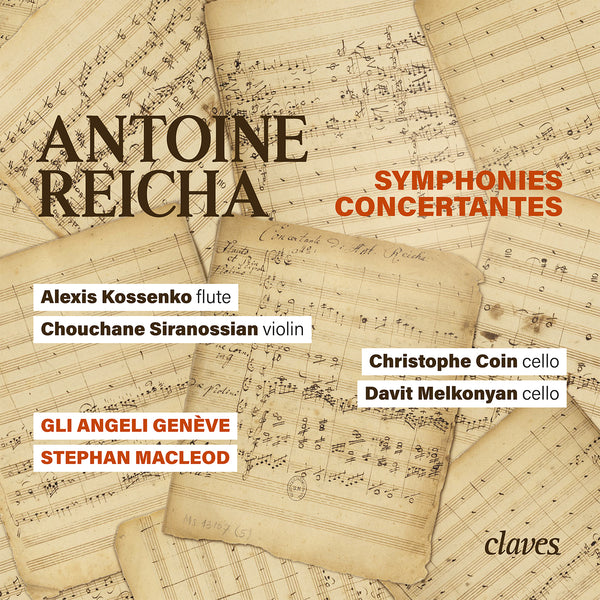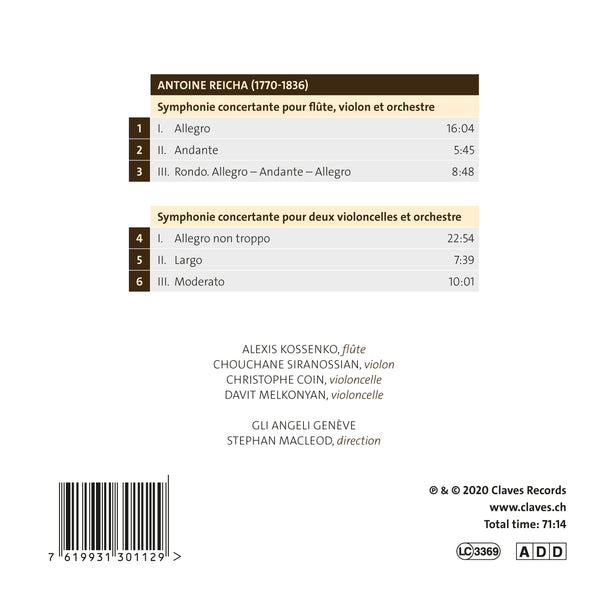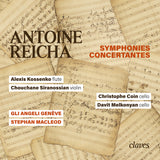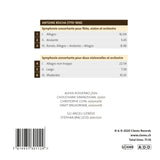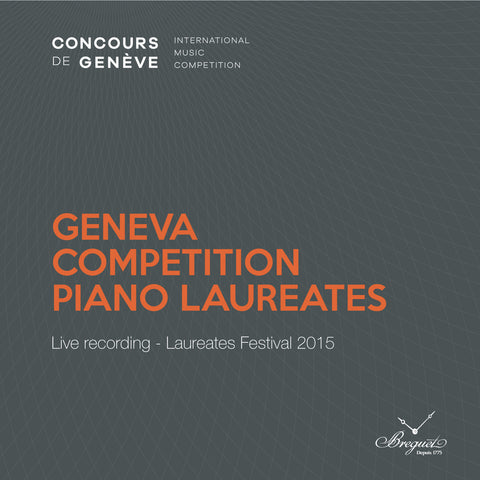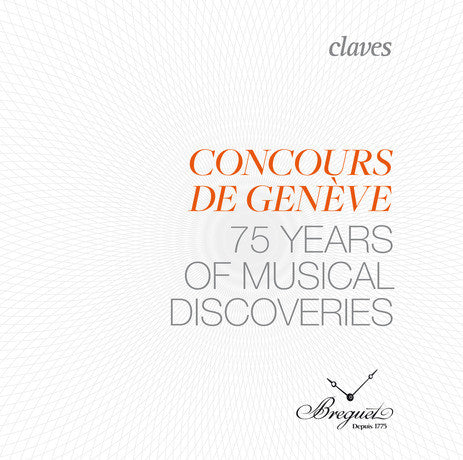(2020) Antoine Reicha: Symphonies Concertantes
Kategorie(n): Concerto Orchester Raritäten
Instrument(e): Violoncello Flöte Geige
Hauptkomponist: Antoine Reicha
Ensemble: Gli Angeli Genève
Dirigent: Stephan MacLeod
CD-Set: 1
Katalog Nr.:
CD 3011
Freigabe: 04.12.2020
EAN/UPC: 7619931301129
Dieses Album ist jetzt neu aufgelegt worden. Bestellen Sie es jetzt zum Sonderpreis vor.
CHF 18.50
Dieses Album ist nicht mehr auf CD erhältlich.
Dieses Album ist noch nicht veröffentlicht worden. Bestellen Sie es jetzt vor.
CHF 18.50
Dieses Album ist nicht mehr auf CD erhältlich.
CHF 18.50
Inklusive MwSt. für die Schweiz und die EU
Kostenloser Versand
Dieses Album ist nicht mehr auf CD erhältlich.
Inklusive MwSt. für die Schweiz und die EU
Kostenloser Versand
Dieses Album ist jetzt neu aufgelegt worden. Bestellen Sie es jetzt zum Sonderpreis vor.
CHF 18.50
Dieses Album ist nicht mehr auf CD erhältlich.
This album has not been released yet.
Pre-order it at a special price now.
CHF 18.50
Dieses Album ist nicht mehr auf CD erhältlich.
CHF 18.50
Dieses Album ist nicht mehr auf CD erhältlich.
SPOTIFY
(Verbinden Sie sich mit Ihrem Konto und aktualisieren die Seite, um das komplette Album zu hören)
ANTOINE REICHA: SYMPHONIES CONCERTANTES
Bonn and Vienna around 1800: two Sinfonia Concertante by Antoine Reicha (1770-1836)
The two Sinfonia Concertante for Violin and Flute and for two Cellos by Antoine Reicha show an astonishing balance between innovation and reflection. They bear witness to an outstanding virtuosity and art of composition, which revolutionise forms through spectacular, enthusiasm-provoking lines of execution and through novelties of writing that impact their deeper structures. A composer who established a link between the Enlightenment and Romanticism, Vienna and Paris, Joseph Haydn and César Franck (one of the last among his many pupils), Reicha can no longer be reduced to his theoretical and didactic dimension alone: his extensive work, still too little known, continues to surprise us.
Hervé Audéon
Reicha in 2020
When you look closely and without preconceived ideas at Anton Reicha’s compositions, and measure their quality and originality, you wonder why his work has met such a strange and unusual fate in the history of music: why did such an inventive and obviously gifted composer not receive some of the fame granted to some of his contemporaries? Was Beethoven’s genius so overwhelming that it cast most of his contemporaries into the shadows, especially a composer like Reicha, who was born the same year as him? Or was it because Reicha, not very gifted at promoting his works, gave up fighting for them to be performed and published? Did he finally give up any quest for recognition for his compositions in favour of his work as a theorist, which had a real impact in his day, composing relentlessly but without feeling the need to be performed?
This fascinating and uncommon story of exceptional music written partly for oneself surprisingly echoed our recording project of the two Sinfonia Concertante. We were indeed confronted with opposing winds. While the two works were to be recorded together in March 2020 following a concert in Geneva, we only could perform the first one while on the next day, the Covid-19 pandemic had taken over European border control, as well as concert halls and recording studios, so that it seemed that our project would never come to fruition. Reicha was silenced again.
The Sinfonia Concertante for two Cellos was recorded in June 2020, on the occasion of a concert with a modified programme, the staging of which was something of a miracle, given the context of the pandemic. Through the coincidence of confinement and calendar, for most of the musicians of Gli Angeli Genève, the last concert before the heavy curtain of the coronavirus fell was the one in March, and the first after three months of silence the one in June. For our reunion, we had to work with masks on and maintain a very unusual distance between the members of the orchestra - there was no question of a single music stand for two violinists for example; but we could make music again, start practising our profession again.
We will all remain marked, in this strange year, by the nature of this long break, which we opened and then closed with Reicha’s music.
Stephan MacLeod
The Artists
Alexis Kossenko, flûte
Chouchane Siranossian, violon
Christophe Coin, violoncelle
Davit Melkonyan, violoncelle
Gli Angeli Genève
Helena Zemanova, premier violon
Eva Saladin, Adrien Carré, Angelina Holzhofer, Claire Foltzer, violons I
Ivan Iliev, Murielle Pfister, Stéphanie Erös, Coline Ormond, violons II
Deirdre Dowling *, Caroline Cohen-Adad, Bettina Ruchti, Martine Schnorhk **, altos
Hager Hanana, Clément Dami *, Oleguer Aymami **, violoncelles
Michaël Chanu, Cléna Stein, contrebasses
Thomas Müller, Isabelle Bourgeois, cors
Alexis Kossenko, Sarah van Cornewal, flûtes **
Emmanuel Laporte, Claire Thomas, hautbois
Philippe Miqueu, Carles Cristobal, bassons **
Stephan MacLeod, direction
Symphonie concertante pour flûte, violon et orchestre *
Symphonie concertante pour deux violoncelles et orchestre **
À la (re)découverte d’Anton Reicha avec l’Ensemble Gli Angeli Genève chez @clavesrecords https://t.co/JapwrCXjGw
— ResMusica (@ResMusica) September 10, 2021
Bonn and Vienna around 1800: two Sinfonia Concertante by Antoine Reicha (1770-1836)
The two Sinfonia Concertante for Violin and Flute and for two Cellos by Antoine Reicha show an astonishing balance between innovation and reflection. They bear witness to an outstanding virtuosity and art of composition, which revolutionise forms through spectacular, enthusiasm-provoking lines of execution and through novelties of writing that impact their deeper structures. A composer who established a link between the Enlightenment and Romanticism, Vienna and Paris, Joseph Haydn and César Franck (one of the last among his many pupils), Reicha can no longer be reduced to his theoretical and didactic dimension alone: his extensive work, still too little known, continues to surprise us.
Hervé Audéon
Reicha in 2020
When you look closely and without preconceived ideas at Anton Reicha’s compositions, and measure their quality and originality, you wonder why his work has met such a strange and unusual fate in the history of music: why did such an inventive and obviously gifted composer not receive some of the fame granted to some of his contemporaries? Was Beethoven’s genius so overwhelming that it cast most of his contemporaries into the shadows, especially a composer like Reicha, who was born the same year as him? Or was it because Reicha, not very gifted at promoting his works, gave up fighting for them to be performed and published? Did he finally give up any quest for recognition for his compositions in favour of his work as a theorist, which had a real impact in his day, composing relentlessly but without feeling the need to be performed?
This fascinating and uncommon story of exceptional music written partly for oneself surprisingly echoed our recording project of the two Sinfonia Concertante. We were indeed confronted with opposing winds. While the two works were to be recorded together in March 2020 following a concert in Geneva, we only could perform the first one while on the next day, the Covid-19 pandemic had taken over European border control, as well as concert halls and recording studios, so that it seemed that our project would never come to fruition. Reicha was silenced again.
The Sinfonia Concertante for two Cellos was recorded in June 2020, on the occasion of a concert with a modified programme, the staging of which was something of a miracle, given the context of the pandemic. Through the coincidence of confinement and calendar, for most of the musicians of Gli Angeli Genève, the last concert before the heavy curtain of the coronavirus fell was the one in March, and the first after three months of silence the one in June. For our reunion, we had to work with masks on and maintain a very unusual distance between the members of the orchestra - there was no question of a single music stand for two violinists for example; but we could make music again, start practising our profession again.
We will all remain marked, in this strange year, by the nature of this long break, which we opened and then closed with Reicha’s music.
Stephan MacLeod
The Artists
Alexis Kossenko, flûte
Chouchane Siranossian, violon
Christophe Coin, violoncelle
Davit Melkonyan, violoncelle
Gli Angeli Genève
Helena Zemanova, premier violon
Eva Saladin, Adrien Carré, Angelina Holzhofer, Claire Foltzer, violons I
Ivan Iliev, Murielle Pfister, Stéphanie Erös, Coline Ormond, violons II
Deirdre Dowling *, Caroline Cohen-Adad, Bettina Ruchti, Martine Schnorhk **, altos
Hager Hanana, Clément Dami *, Oleguer Aymami **, violoncelles
Michaël Chanu, Cléna Stein, contrebasses
Thomas Müller, Isabelle Bourgeois, cors
Alexis Kossenko, Sarah van Cornewal, flûtes **
Emmanuel Laporte, Claire Thomas, hautbois
Philippe Miqueu, Carles Cristobal, bassons **
Stephan MacLeod, direction
Symphonie concertante pour flûte, violon et orchestre *
Symphonie concertante pour deux violoncelles et orchestre **
À la (re)découverte d’Anton Reicha avec l’Ensemble Gli Angeli Genève chez @clavesrecords https://t.co/JapwrCXjGw
— ResMusica (@ResMusica) September 10, 2021
Return to the album | Read the booklet | Composer(s): Antoine Reicha | Main Artist: Stephan MacLeod




STUDIO-MASTER (HOCHAUFLÖSENDES AUDIO)
Alexis Kossenko
Alle Alben
Amethys Design
Antoine Reicha
Auf Lager
Chouchane Siranossian
Christophe Coin
Concerto
Davit Melkonyan
Flöte
Geige
Gli Angeli Genève
High-resolution audio - Studio master quality
Montres Breguet & Concours de Genève
Orchester
Raritäten
Stephan MacLeod
Violoncello
Alexis Kossenko
Alle Alben
Amethys Design
Antoine Reicha
Auf Lager
Chouchane Siranossian
Christophe Coin
Concerto
Davit Melkonyan
Flöte
Geige
Gli Angeli Genève
High-resolution audio - Studio master quality
Montres Breguet & Concours de Genève
Orchester
Raritäten
Stephan MacLeod
Violoncello








